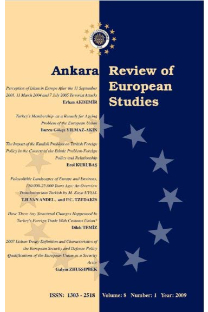AB ve Türkiye Arasında Yeşil Dönüşüm için İşbirliği Kanalları
Bu makalenin yeşil dönüşüm sürecinde AB ve Türkiye arasında işbirliğinin hangi potansiyel kanallar üzerinden geliştirilebileceğini ortaya koymaktır. Avrupa Yeşil Mutabakatı (AYM) var olan düzenlemeleri birbiriyle uyumlu bir biçimde toplulaştırmıştır. Dahası, AYM Sınırda Karbon Düzenlemesi gibi yeni mekanizmalar tasarlamış ve Döngüsel Ekonomi Eylem Planı’ndaki düzenlemeleri genişletmiştir. Bu düzenlemeler sadece AB firmalarını değil, AB ile ticari ilişkide bulunan tüm AB- dışı firmaları da etkileyecektir. Dolayısıyla AYM’ye uyum, Türk ihracatçıların karşılaşabileceği potansiyel maliyetleri düşürmek için önemlidir. AYM’ye yanıt olarak Türkiye, Temmuz 2021’de 9 tema altında 81 politika eylemi içeren Avrupa Yeşil Mutabakatı Eylem Planı’nı açıklamıştır. Bu çalışma konuyla ilgili AB adem-i merkezi ajansları üzerinden kurulacak işbirliklerinin AB-Türkiye ilişkilerini yeniden canlandırabileceğini savunmaktadır.
CHANNELS OF COOPERATION BETWEEN THE EU AND TURKEY ON GREEN TRANSFORMATION
This paper demonstrates the potential channels of cooperation between the EU and Turkey on green transformation. The European Green Deal (EGD) coherently brings together the existing regulatory frameworks. Moreover, EGD introduces measures such as the Carbon Border Adjustment Mechanism and extends the regulations under the Circular Economy Action Plan. These regulations will affect not only firms in the EU but also all non-EU trade partners of the EU. Adapting to the EGD is, hence, crucial for minimizing the potential costs on the Turkish exporters. In response to the EGD, Turkey prepared a European Green Deal Action Plan in July 2021 consisting of 81 targets under 9 themes. This paper argues that cooperation through the relevant decentralized EU agencies would help to revitalize the EU-Turkey relations.
___
- Acar, Sevil and Yeldan, Alp Erinç. “Environmental impacts of coal subsidies in Turkey: A general equilibrium analysis”. Energy Policy 90 (2016), 1–15.
- Aşıcı, Ahmet Atıl. “Türkiye Küresel İklim Rejimi’ne Neden Uyum Sağlamalı?”, TESEV Değerlendirme Notları 2021/4, (2021), Istanbul Turkey.
- Aşıcı, Ahmet Atıl. “Sınırda Karbon Düzenleme Mekanizması İşleyişi ve Riskli Ürün Analizi”, Yeşil_İz Teknik Not 1 (2022). https://yesiliz.khas.edu.tr/arastirmalar/ teknik-not-1-sinirda-karbon-duzenleme-mekanizmasi-isleyisi-ve-riskli-urun- analizi-15
- Ecer, Kübra, Güner, Oğuz and Çetin, Murat. “Avrupa yeşil mutabakatı ve Türkiye ekonomisinin uyum politikaları”. İşletme ve İktisat Çalışmaları Dergisi, 9(2), (2021), 125-144.
- EU Commission. Just and sustainable economy: Commission lays down rules for companies to respect human rights and environment in global value chains. Press Release. (2022), [retrieved from https://ec.europa.eu/commission/ presscorner/detail/en/ip_22_1145 ]
- Europe Beyond Coal, CAN Europe, SEFiA, WWF-Turkey, Greenpeace Mediterranean, İklim Değişikliği Politika ve Araştırma Derneği, and 350.org, Karbon Nötr Türkiye Yolunda İlk Adım: Kömürden Çıkış 2030, (2021), URL: https://sefia.org/wp-content/uploads/2020/09/komurden-cikis-2030- min.pdf
- Müftüler-Baç, Meltem. The Revitalization of the Turkish-European Union Relations: Old Wine in New Bottles?. IPC-Mercator Policy Brief, (2015), (Istanbul: Istanbul Policy Center)
- Kaeding, Michael and Krull, Frederic. “Assessing the Potential of EU Agencies for the Future of EU-Turkey Relations, Part I: Turkey’s Full Membership without Voting Rights in the EEA and EMCDDA”, IPC-Mercator Policy Brief, (2021), (Istanbul: Istanbul Policy Center).
- Lavenex, Sandra. “The external face of differentiated integration: third country participation in EU sectoral bodies”, Journal of European Public Policy, 22:6, (2015), 836-853, DOI: 10.1080/13501763.2015.1020836
- McKinsey Global Institute, Climate risk and response: Physical hazards and socioeconomic impacts, (2020), Report available at: https://www.mckinsey.com/business-functions/sustainability/our- insights/climate-risk-and-response-physical-hazards-and-socioeconomic- impacts
- Ministry of Agriculture and Forestry, AB Entegre Uyum Stratejisi (UÇES) (2007 – 2023), (2006), Ankara.
- Ministry of Trade, European Green Deal Action Plan (EGDAP), Ministry of Trade, (2021), https://ticaret.gov.tr/data/60f1200013b876eb28421b23/MUTABAKAT% 20YE%C5%9E%C4%B0L.pdf
- Şahin, Ümit, Osman Bülent Tör, Bora Kat, Saeed Teimourzadeh, Kemal Demirkol, Arif Künar, Ebru Voyvoda, and Erinç Yeldan. Türkiye’nin Karbonsuzlaşma Yol Haritası: 2050’de Net Sıfır. Istanbul Policy Center (2021), URL: https://ipc.sabanciuniv.edu/Content/Images/CKeditorImages/20211103- 19115588.pdf
- STM ThinkTech, “Yeni İklim Rejimine Doğru: Avrupa Yeşil Mutabakatı ve Türkiye’ye Etkileri Üzerine Bir İnceleme”. Trend Analizi (2021). Available at: https://thinktech.stm.com.tr/uploads//docs/1640160571_stmyeniiklimrejimined ogru.pdf?
- TEİAŞ, Türkiye Elektrik Üretim-İletim İstatistikleri. (2020), URL: https://www.teias.gov.tr/tr/turkiye-elektrik-uretim-iletim-istatistikleri TurkStat, Greenhouse Gas Emissions Statistics, 1990 – 2020 (2022).
- TUSIAD, Ekonomik Göstergeler Merceğinden Yeni İklim Rejimi Raporu, (2020), https://tusiad.org/tr/yayinlar/raporlar/item/10633-ekonomik-gostergeler- merceginden-yeni-i-klim-rejimi-raporu.
- UNCTAD, A European Union Carbon Border Adjustment Mechanism: Implications for developing countries, (2021), (available at https://unctad.org/system/ files/official-document/osginf2021d2_en.pdf )
- World Bank, Adjusted savings: energy depletion (% of GNI). (2021) Retrived from https://data.worldbank.org/indicator/NY.ADJ.DNGY.GN.ZS
- World Bank, CO2 emissions (metric tons per capita). (2021), Retrived from https://data.worldbank.org/indicator/EN.ATM.CO2E.PC
- WRI/CAIT Climate Data Explorer, Historic Greenhouse Gas Emissions, (2021), Retrieved from: http://cait.wri.org/
- ISSN: 1303-2518
- Yayın Aralığı: Yılda 2 Sayı
- Başlangıç: 2001
- Yayıncı: Ankara Üniversitesi Avrupa Toplulukları Araştırma ve Uygulama Merkezi
Sayıdaki Diğer Makaleler
AB ve Türkiye Arasında Yeşil Dönüşüm için İşbirliği Kanalları
AVRUPA’DA REKABETÇİ SÜRDÜRÜLEBİLİRLİĞİN POLİTİK ARACI: UFUK AVRUPA PROGRAMI
Düzeltme: Bölgesel Güç olarak Avrupa Birliği ve Dış Politika
Kitap İncelemesi: THE EUROPEAN UNION’S NEW FOREIGN POLICY
Teritoryayla Sınırlandırma: Avrupa Birliği ve Çok Düzeyli Teritoryal Yönetişim
AVRUPA BİRLİĞİ’NİN DEMOKRASİ TEŞVİKİ: TEMEL STRATEJİLER VE YAKLAŞIMLAR
Fulya AKGÜL DURAKÇAY, Sedef EYLEMER
